Eliza Knight's Blog, page 48
October 16, 2012
Julie Peakman's New Book: Mighty Lewd Books
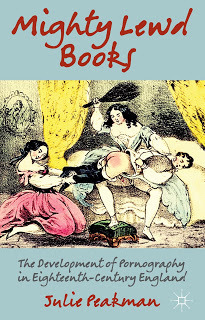
At Last! Gasp!
The paperback of Julie Peakman’s
Mighty Lewd Books Published by Palgrave Macmillan October 2012.
Now considered a classic amongst scholars of eighteenth century and the history of pornography, Mighty Lewd Books provides a radical new approach to the study of sexuality in an in-depth investigation of the development of pornography. Through the examination of more than 500 pieces of British erotica, it looks at sex as seen in culture, religion and medicine throughout the long eighteenth-century.
A new form of flagellation pornography burst to the fore in the 1770s when erotic fiction became littered with whipping scenarios. Prior to this, English erotica had included a particular style of bawdy material marked by euphemisms and double entendres. Erotic poems, salacious prints and obscene satires were sold in London coffee-shops, in taverns, on street corners and in various book shops along the Strand and in Covent Garden. The underworld of booksellers and distributors are explored through trial records and witness depositions. This book also explores popular images in erotica; female flagellants whipping their submissive charges; depraved monks corrupting innocent nuns; libertine rascals seducing young virgins; and rakes carousing with their whores. Using the evidence of erotica, and taking a feminist approach within a framework of gender history, this book challenges the traditional view that women were generally seen as sexually passive.
About the Author: Julie Peakman is a historian, author and broadcaster who is internationally renowned for her work on the history of sexuality. Her books include Lascivious Bodies: A Sexual History of the Eighteenth Century; a six-volume edition of A Cultural History of Sexuality and the edited collection Sexual Perversion 1670–1890. Since its first publication her ground-breaking book Mighty Lewd Books has become essential reading for anyone interested in eighteenth century erotica and the history of sexuality. She lives in London and on the Greek island of Leros.
Reviews: ‘This . . . fascinating and intelligent survey shows how an explosion of obscene literatureimmediately followed the wild success of pioneering (but largely non-pornographic) fictions by Defoe, Swift, Richardson and their imitators . . . Porn’s strongest selling points were that it was sexy, unrespectable and forbidden, of course, but Julie Peakman shows that it had other attributes, not always connected directly with sex. It popularised new scientific ideas in botany, anatomy and electricity. It stoked the fires of anti-Catholicism with its lecherous monks and nuns, and it encompassed radical ideas in politics.’— Financial Times
‘ . . . fascinating book . . . well-written and researched . . . this book offers intriguing new insights into a hidden area of gender history, challenging many preconceptions about the c.18th century.’— BBC History Magazine
Pre-Order on Amazon!
Published on October 16, 2012 01:30
October 10, 2012
Guest Author Sally Smith O'Rourke: A Bit About her Books and Jane Austen
 Today I'd like to welcome guest author, Sally Smith O'Rourke to History Undressed! She writes amazing books featuring Jane Austen and characters from her classic novels. Leave a comment for your chance to win a copy of either The Man Who Loved Jane Austen or Yours Affectionately, Jane Austen (two winners!)
Today I'd like to welcome guest author, Sally Smith O'Rourke to History Undressed! She writes amazing books featuring Jane Austen and characters from her classic novels. Leave a comment for your chance to win a copy of either The Man Who Loved Jane Austen or Yours Affectionately, Jane Austen (two winners!)I had just finished reading David McCullough’s John Adams when I began my Jane Austen journey and was always a bit intrigued by the fact that the biographies of the iconic author and the founding father began the same way; a cold and blustery December day in 1775.
John Adams left his home in that month and year to attend the second continental congress in Philadelphia. It may not have been the actual shot heard round the world (that being the musket fire at Concord) but the result of that convention was most definitely heard round the world.
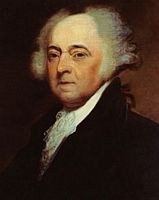 John AdamsAt the same time across the Atlantic in the English countryside a baby girl was born at Steventon Rectory. Her cry may have only been heard by those in the house but in the years to come her pen would have an impact on the world to match Thomas Jefferson’s.
John AdamsAt the same time across the Atlantic in the English countryside a baby girl was born at Steventon Rectory. Her cry may have only been heard by those in the house but in the years to come her pen would have an impact on the world to match Thomas Jefferson’s.It may seem a stretch and some may even consider it a trivialization of Jefferson’s words but I believe that Austen’s impact on the world is no less important than Jefferson’s. The effect of Jane’s writing maybe more subtle than that of the Virginian and Thomas Paine but it is no less influential.
Jefferson’s and Paine’s words instigated and promoted a revolution, a war of independence. Jane’s words had no such excessive consequence. Still in her own, quiet, genteel yet powerful way she declared and promoted the same principles of freedom and self-regulation as our American forefathers.
In all her novels Jane advocates independence of person and thought, the rights of all and acceptance of responsibility of those rights and actions.
Jane Austen may not have incited military actions as Jefferson did but even as an avowed royalist I doubt not that Jane Austen firmly believed in his declaration of the right to life, liberty and the pursuit of happiness for all.
She had more liberty and independence than most women of her era but she was still restricted by societal mores that she found stifling. So she wrote strong, intelligent, independent women and the men who love them. Although she based most of her characters on the people in her life, one character has remained an enigma, Mr. Darcy.
A few years ago I re-read all of Austen’s books and while her characters are fun and interesting, I was far more intrigued by the author herself. In an era when men treated women as chattel, to be sold to the highest bidder and bear heirs to maintain family fortunes, Austen’s men were different.
Mr. Darcy was different in 1813 when the literary world met him for the first time and he is different today. A man of his stature and wealth would very likely, even today, simply walk away from a rejection such as Elizabeth’s without ever looking back. But Darcy is dissatisfied with himself and makes a concerted effort to change. Frankly there aren’t many men today who would do that. Darcy is the ultimate leading man because he altered his perceptions and attitudes with no expectation other than bettering himself. By doing so, however, he is able to please the one woman who is worthy of being pleased.
Austen not only wrote the inimitable Mr. Darcy but six men who loved the six strong and intelligent women she also created. The men love the women not in spite of their strength and intelligence but because of those attributes.
Thus infatuated with Jane Austen, my husband and I decided to write a ‘what if’ story about who the real Mr. Darcy might have been. In our hands he became a 21st century man who accidently slips through a rip in the fabric of time, waking up in Jane Austen’s bed.
In The Man Who Loved Jane Austen, Fitzwilliam Darcy is an American horseman, master of a 200 year old estate in Virginia’s Shenandoah Valley, Pemberley Farms; breeder and trainer of champion jumpers. On a buying trip to England he and a new horse jump a rock wall and stumble into the spring of 1810.
Three years later Manhattan artist Eliza Knight crashes the gates of Pemberley Farms armed with an unopened letter written to Fitzwilliam Darcy from Jane Austen and she wants answers. Darcy spins an epic tale of love and romance in Regency England, convincing the skeptic and pragmatic artist that the letter is meant for him.
Yours Affectionately, Jane Austen continues the story, reacquainting readers with Fitz Darcy and Eliza Knight. It juxtaposes their blossoming romance with Jane Austen’s life the summer of 1813 as she copes with the subtle celebrity of being the ‘Lady’ who wrote Sense and Sensibility and Pride and Prejudice.
As the 200th anniversary of Pride and Prejudice nears (January 2013) Yours Affectionately, Jane Austen delves into the complex nature of the man who is the embodiment of Jane Austen’s most romantic and legendary hero and the women who love him.
Ann Channon of Jane Austen’s House Museum (Chawton Cottage) said:“I have finished Yours Affectionately, Jane Austen and really liked it. Your books are imaginative and very different. Your ideas are new and fresh and endearing. Well, done.”
A small taste of Yours Affectionately, Jane Austen…
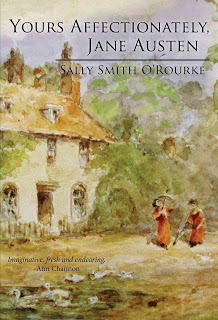 Yours Affectionately, Jane Austen
Chapter 5
Yours Affectionately, Jane Austen
Chapter 5
Although the sun was fully up in the Virginia summer sky, it was not yet hot. Fitz found jumping exhilarating; the cool morning air caressing his face, and Lord Nelson, so strong and graceful, took all the jumps with no effort. Heritage Week was over so things could get back to normal. He shrugged. Whatever normal is. He realized there was a very good chance that his normal was about to change radically. Eliza’s letter—the one she had found written to him from Jane—had ended his search for the truth of his Regency encounter. But Eliza did much more than give him the letter.He had been merely surviving, not living, in the years since his mother’s death. He’d thrown himself into the business of Pemberley Farms to the exclusion of almost everything else. Eliza’s arrival had heralded an acute awareness of that fact. It was as though a light was suddenly shining so he could see the world around him. She made him want to live again. And she had given him the letter… Jane’s letter. Fitz reined Lord Nelson to a walk as they entered the cool shade of the woods on the edge of his property. Jane. He had spent more than three years seeking proof of his meeting with her and of her feelings for him. Almost as if he’d been transported again back to Chawton in 1810, the image of Jane’s sweet face flooded his mind. He thought back to that morning and his inauspicious entrance into Jane Austen’s life. The combination of his head injury and the laudanum prescribed by Mr. Hudson, the Austen family physician, caused Darcy to slip in and out of consciousness. He tried to sit up, the effort making him dizzy.Jane gently laid a hand on his chest. “Please, Mr. Darcy, Mr. Hudson wants you to remain still.”Through a cotton mouth, his head spinning, Darcy asked, “Mr. Hudson?”“The doctor,” Jane said. “You must rest now Mr. Darcy.” The American looked at her face. Her curiosity was palpable even in his drugged state. Unable to think clearly, never mind responding to questions he wasn’t sure he could answer, he closed his eyes completely and turned his head away.Jane returned to her vanity table where she continued to write; a single candle and the flames in the fireplace her only light. Interrupted in her writing by a low murmur from Darcy, she took the candle and quietly approached the bed. He was tossing back and forth, his face flushed and contorted; he was speaking in quiet tones, a hodgepodge of words that meant nothing to her. He spoke what she could only suppose were the nonsensical ramblings of a sick brain; she attributed words like television and jet to his head injury and delirium. She placed her hand softly on his cheek and was distressed by the heat radiating from him. Using fresh linen soaked in water from the pitcher on her wash stand, Jane swabbed his face and neck, then laid it across his forehead. It seemed to calm him and she went back to her writing.Each time he grew restless Jane stopped writing and went to the bed to refresh the linen with cool water. After three episodes in close succession she remained on the edge of the bed so she was at hand, and each time he started to toss and turn she would caress his face and neck with the cool, damp linen in hopes that it would, in time, reduce his fever.She stayed there until Darcy’s features turned placid and he was breathing more evenly. He finally seemed to be sleeping comfortably. She laid her small, soft hand on his cheek. The fever was broken. She dropped the cloth into the basin. Stiff from sitting in one position for so long without support, she stood up and stretched. She was not particularly tired but needed to get some rest.Quietly she crossed the wooden floor and slipped the small pages of writing she was working on into the drawer of the vanity, then took a nightgown from the closet next to the fireplace. Glancing back at the bed she stepped behind the screen.He opened his eyes just enough to see her slender, full-breasted figure silhouetted on the muslin screen, back-lit by the remnants of the fire as the light fabric of her nightgown floated down to envelope her.Jane stopped at the bed before making her way to Cassandra’s room for a few hours of sleep. As she stood over him he watched surreptitiously through the veil of his eyelashes. She leaned down and whispered, “Good night, Mr. Darcy,” almost brushing his lips with her own. In spite of his continuing laudanum haze, he could see that her eyes were filled with a tenderness that caused him to grab her hand as she straightened up; he didn’t want her to go.Without opening his eyes or letting go of her hand he said, “Please don’t leave me.”Unsure whether this was further evidence of the delirium or whether he was actually requesting her presence, she pulled her hand away. He did not move to take it again but said, “Please, stay.”Cognizant of Mr. Hudson’s admonition of keeping the injured American calm and concerned her leaving might agitate him, Jane sat once again on the edge of the bed. Darcy smiled in the flickering flame of the dying fire. He said nothing more but gently took her hand. He did not relinquish it again until she rose to move to a chair by the side of the bed where she finally slept.The movement woke him. His mind finally clear of drugs, he scanned the room in the dim, pre-dawn light. There were no electrical outlets or switches, no lamps, television or telephone, and the only clock appeared to be pendulum driven. Everyone he’d seen wore costumes similar to the ones people wore to the Rose Ball. Those things and the medical treatment he had received led him to the inexplicable conclusion that somehow he’d fallen into another time—a time when Jane Austen was alive.And there she sat, serene in what had to be an uncomfortable position for sleep; his nurse, his savior and much prettier than she was depicted in the only portrait of her to survive to the twenty-first century. She was not the brazen hussy of Darcy family lore but a sweet and loving woman who took care of him without concern for her own safety or expecting anything in return. His mother would have said she was a true Christian.As he watched her in the pale light of the dying embers his head started to throb as though a nail was being driven through it. He closed his eyes and blessed sleep overtook him. Jane was an incredibly strong, intelligent, willful and virtuous woman who followed the propriety of the day… mostly. During the last three years he’d often wondered what might have happened between them if he’d been forced to stay in early nineteenth-century England. Of course with the way her brothers felt about him, he probably wouldn’t have seen her again.If the circumstances had been different would he have married her? He could have been happy with her, he supposed, but over the years he’d come to realize that the love he felt for her was based on who she was, the awe in which he held her, caring for him when she certainly didn’t have to, loving him. Then again, did she love him? She had never said it and the letter Eliza had found and given him showed obvious affection but she urged him to find his true love. Apparently she didn’t think she was it. Had they ever loved each other or had it just been a fling across the ages?He laughed. What difference did any of it make? Jane Austen had been dead for almost two hundred years. Still, the undisputed icon of witty English romance had kissed him whether she loved him or not. He still had to pinch himself to believe it had ever happened.He had no such questions about Eliza. Everything felt right when he was with her. This was no fling. He had no idea where they were headed, but for the first time in years he was looking forward to the rest of his life. As long as Eliza was with him he didn’t care where they were headed.Fitz and Lord Nelson crossed the bridge at a leisurely gait; the ground fog was burning off in the warm morning sun. Had it really been only two days since he and the great stallion were galloping across the bridge before the fog had lifted and run Eliza off the road and into a muddy drainage ditch? He hadn’t even realized she was there until it had happened. When he did, he brought Nelson to a stop and, without questioning who she was or why she was walking along a road on his property, he had lifted her onto Lord Nelson’s back and then swung up behind her. She was slightly light headed from the sudden fall, and once on the horse she had leaned against his chest and he’d had to control a strong desire to kiss the top of her head. He still didn’t understand how a complete stranger could make him feel that way, but he didn’t really care. From the first moment, being with her felt right and wonderful and that was all that mattered.She had touched something in him that no one else ever had, including Jane, even before he knew her. At the Austen exhibit at the New York Public Library he had found himself staring at her. He laughed remembering that he had thought of her as a raven-haired beauty. Then two days ago she had come out of the fog and into his life.He had told her his story about jumping through a rift in time and meeting Jane Austen. It had been very difficult at first, but once he started it tumbled out and had been a relief that he wasn’t carrying it around anymore. It was as though a weight had been lifted and this slight, feisty New Yorker had done the lifting. She had listened to him with an intensity that had made her a part of the story. She had been kind and compassionate—he had seen real grief when she asked him about leaving Jane—and she had given him the letter that answered his questions about whether he’d actually met Jane Austen and how Jane felt about him.Jane would always hold a special place in his heart, but Eliza held his heart. Maybe it was too early to take it all for love, but it certainly felt the way he'd always thought love is supposed to feel. Horse and rider stepped out from the cool canopy of the woods and into the warm summer sun. Spurring his favorite horse to a full gallop Fitz guided him over every fence and stream on their way back to the barn.
Purchase Links:
Yours Affectionately, Jane Austen
The Man Who Loved Jane Austen
Maiden Stone Lighthouse
Christmas Sea Pines Cottage
Visit Sally Smith O'Rourke:
Website
 Austenticity
Austenticity
Published on October 10, 2012 06:29
October 9, 2012
Historical Romance Guest Author Samantha Grace
Today I'd like to welcome our guest author, Samantha Grace to History Undressed! Ms. Grace writes Regency romance and is here today to talk a bit about her latest release in her Beau Monde Bachelor Series, Miss Lavigne's Little White Lie. Leave a comment for your chance to win a copy!
Thank you so much for having me at History Undressed today. I’m not a historian by any means, but I find the past absolutely fascinating. I love sites like this that share what others have learned in their research.
My 8thgrade American History teacher is responsible for instilling a love for history in me. She was a ‘no nonsense or I will crush you’ type of teacher, but in spite of my fear of her, I couldn’t wait for her class every day. She did something no other teacher had ever done in my experience. She told stories that brought history to life.
I suppose that’s what authors do, too. We don’t necessarily tell true stories, but it’s important to have as many facts straight as we can to lend authenticity to a story.
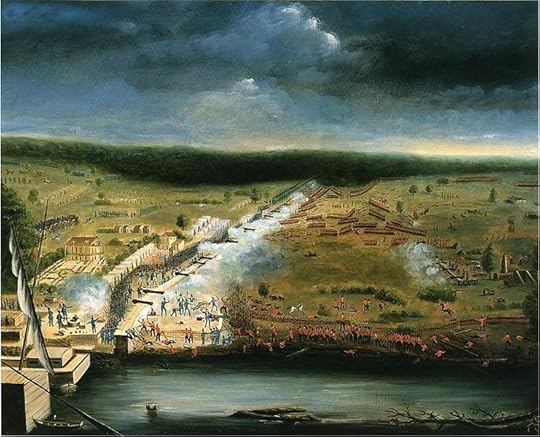 Miss Lavigne’s Little White Lie was pretty heavy on research even though I only used a small portion of what I learned. Since the book begins in New Orleans, I had to research what the city was like in 1819. I needed an old map, so I would know how my heroine and her family made it to the wharf where they would board Captain Daniel Hillary’s ship. I researched the War of 1812 and the Creole people, because Lisette Lavigne is a descendant of the Creole who came to New Orleans from the West Indies rather than France. I studied British colonies in the Caribbean, because the ship makes a stop to resupply. I had to study serious illnesses that could result in death without it being a given. And then of course, I needed to know as much as possible about wooden ships.
Miss Lavigne’s Little White Lie was pretty heavy on research even though I only used a small portion of what I learned. Since the book begins in New Orleans, I had to research what the city was like in 1819. I needed an old map, so I would know how my heroine and her family made it to the wharf where they would board Captain Daniel Hillary’s ship. I researched the War of 1812 and the Creole people, because Lisette Lavigne is a descendant of the Creole who came to New Orleans from the West Indies rather than France. I studied British colonies in the Caribbean, because the ship makes a stop to resupply. I had to study serious illnesses that could result in death without it being a given. And then of course, I needed to know as much as possible about wooden ships.
I was most interested in what life would be like on Daniel’s ship, the Cecily. I thought it might be fun to share some of what I learned. Travel by wooden ships was a real hardship, and many people didn’t survive the journey.
The ship’s captain (known as the shipmaster, but addressed as Captain) had the best living conditions on board. His quarters were located at the stern (back) of the ship and usually on an upper deck with natural light and fresh air available. His quarters often contained a separate area for sleeping, dining, and conducting business. He also had a private bathroom, which his poor crew didn’t have. Their facilities were often located at the bow of the ship with nothing but boards to sit on and the ocean below them. Yikes! Some of the bigger vessels might have had a head (ship talk for bathroom) below deck with a rudimentary plumbing system that spilled waste into the water.
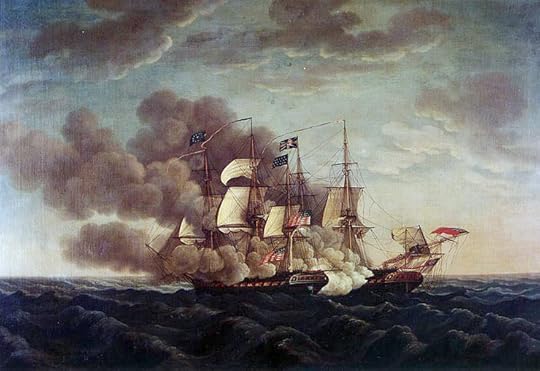 The captain’s first and second mates usually had individual cabins that were approximately 6 feet by 6 feet, although the size could vary by rank. If there weren’t quarters set aside for passengers, the first and second mate might give up their cabins. If someone of VIP status traveled on the ship, the captain might give up his quarters. A lot of ships in the 1800s included quarters for passengers, though.
The captain’s first and second mates usually had individual cabins that were approximately 6 feet by 6 feet, although the size could vary by rank. If there weren’t quarters set aside for passengers, the first and second mate might give up their cabins. If someone of VIP status traveled on the ship, the captain might give up his quarters. A lot of ships in the 1800s included quarters for passengers, though.
Crewmembers didn’t have individual cabins. They slept in the bow of the ship, or wherever they could find a place. Some ships had bunks with straw mattresses or hammocks. Their area was crowded and smelly, and it could get very cold or unbearably hot, depending on the weather. Also sharing space on ship was livestock and poultry, which served as a source of food. I imagine that added to the stench and filth.
There were many dangers associated with sea travel, such as disease, storms, tainted food, shipwrecks, dead calms (no wind that stranded ships indefinitely, which meant they could run out of food and fresh water), and pirates, although they were less plentiful during the regency era.
Here’s a scene from Miss Lavigne’s Little White Lie that shows the biggest danger the Cecily faces on the journey:
The wind-swollen sails of the Mihos carried her over the waves, and her flags whipped from the mast. Frothy white water parted for her bow. Daniel’s newfound enemy would be upon them soon. He handed Lisette the spyglass. She gazed through it and shrank against his side. “It is him.” She passed the glass back to Daniel. “I recognize the flag.”The Mihos’ personal flag displayed a red lion standing erect with claws bared against a white background. Daniel hugged Lisette to him and kissed her temple. “Take Rafe, Serafine, and Amelia below deck. Stay out of sight no matter what transpires on deck. Have I made myself clear?”Lisette’s emerald gaze narrowed and her jaw jutted forward. He returned her glare without blinking. She may dislike him ordering her about like one of his men, but he was in charge. She turned to her entourage. “You heard the captain. We are to cower below deck.”“Now, that’s a good little woman,” he said. To annoy her further, he popped her on the bottom, eliciting an outraged squeal. “Monsieur!”Several of his crew chuckled, and she turned crimson, slaying Daniel with one dirty look. Good. He preferred her angry with him than frightened by the coming confrontation.“Run along.” He made shooing motions with his hands and grinned in the face of her displeasure. She snatched Rafe’s hand in hers and marched to the hatch with him in tow. Serafine hurried behind, throwing a wary glance over her shoulder before disappearing below deck. Jake shook his head and offered his arm to Amelia. “You are hopeless. I’ll be back in a moment. Don’t start the fun without me.”Amelia’s perfect lips turned down. “Jake, you will be careful, won’t you?”“Of course, sweetheart. There’s no cause for concern.”Daniel felt a twinge of apprehension as his brother escorted his wife below deck. What if Daniel had underestimated Reynaud and was placing everyone in danger? Perhaps he should have tried outrunning the other ship. He shook off his uncertainty and squared his shoulders. There was no turning back now. A question for readers: What is your favorite time period or historical location?
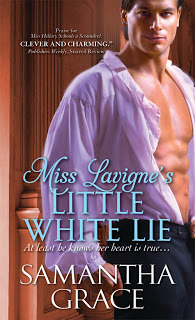 Miss Lavigne’s Little White Lie -- Out Now! Sourcebooks Casablanca
Miss Lavigne’s Little White Lie -- Out Now! Sourcebooks Casablanca
Captain Daniel Hillary's ship is the only one sailing from New Orleans to England, and Lisette Lavigne is bound and determined to be on it! Desperate to save her brother from being thrown into an asylum and to escape her devious fiancé, Lisette offers to pay Daniel any price for safe passage — even if it means warming his bed.
Daniel never allows women on his ship, but Lisette's exotic beauty and spirited nature convinces him that rules are made to be broken. He had no idea that this decision would lead to a hasty marriage, an enraged pursuit by the jilted fiancé, or a dangerous blackmail scheme that could cost him everyone he loves...
Samantha Grace made her debut earlier this year with Miss Hillary Schools a Scoundrel. Her newest regency romance, Miss Lavigne’s Little White Lie, received a starred review from Publisher’s Weekly, and she did a happy dance in her kitchen. Samantha lives with her husband, their two tenacious kids, and an endless parade of characters that inhabit her imagination. You can connect with Samantha at:
Facebook| Twitter | Goodreads| Lady Scribes

Thank you so much for having me at History Undressed today. I’m not a historian by any means, but I find the past absolutely fascinating. I love sites like this that share what others have learned in their research.
My 8thgrade American History teacher is responsible for instilling a love for history in me. She was a ‘no nonsense or I will crush you’ type of teacher, but in spite of my fear of her, I couldn’t wait for her class every day. She did something no other teacher had ever done in my experience. She told stories that brought history to life.
I suppose that’s what authors do, too. We don’t necessarily tell true stories, but it’s important to have as many facts straight as we can to lend authenticity to a story.
 Miss Lavigne’s Little White Lie was pretty heavy on research even though I only used a small portion of what I learned. Since the book begins in New Orleans, I had to research what the city was like in 1819. I needed an old map, so I would know how my heroine and her family made it to the wharf where they would board Captain Daniel Hillary’s ship. I researched the War of 1812 and the Creole people, because Lisette Lavigne is a descendant of the Creole who came to New Orleans from the West Indies rather than France. I studied British colonies in the Caribbean, because the ship makes a stop to resupply. I had to study serious illnesses that could result in death without it being a given. And then of course, I needed to know as much as possible about wooden ships.
Miss Lavigne’s Little White Lie was pretty heavy on research even though I only used a small portion of what I learned. Since the book begins in New Orleans, I had to research what the city was like in 1819. I needed an old map, so I would know how my heroine and her family made it to the wharf where they would board Captain Daniel Hillary’s ship. I researched the War of 1812 and the Creole people, because Lisette Lavigne is a descendant of the Creole who came to New Orleans from the West Indies rather than France. I studied British colonies in the Caribbean, because the ship makes a stop to resupply. I had to study serious illnesses that could result in death without it being a given. And then of course, I needed to know as much as possible about wooden ships. I was most interested in what life would be like on Daniel’s ship, the Cecily. I thought it might be fun to share some of what I learned. Travel by wooden ships was a real hardship, and many people didn’t survive the journey.
The ship’s captain (known as the shipmaster, but addressed as Captain) had the best living conditions on board. His quarters were located at the stern (back) of the ship and usually on an upper deck with natural light and fresh air available. His quarters often contained a separate area for sleeping, dining, and conducting business. He also had a private bathroom, which his poor crew didn’t have. Their facilities were often located at the bow of the ship with nothing but boards to sit on and the ocean below them. Yikes! Some of the bigger vessels might have had a head (ship talk for bathroom) below deck with a rudimentary plumbing system that spilled waste into the water.
 The captain’s first and second mates usually had individual cabins that were approximately 6 feet by 6 feet, although the size could vary by rank. If there weren’t quarters set aside for passengers, the first and second mate might give up their cabins. If someone of VIP status traveled on the ship, the captain might give up his quarters. A lot of ships in the 1800s included quarters for passengers, though.
The captain’s first and second mates usually had individual cabins that were approximately 6 feet by 6 feet, although the size could vary by rank. If there weren’t quarters set aside for passengers, the first and second mate might give up their cabins. If someone of VIP status traveled on the ship, the captain might give up his quarters. A lot of ships in the 1800s included quarters for passengers, though. Crewmembers didn’t have individual cabins. They slept in the bow of the ship, or wherever they could find a place. Some ships had bunks with straw mattresses or hammocks. Their area was crowded and smelly, and it could get very cold or unbearably hot, depending on the weather. Also sharing space on ship was livestock and poultry, which served as a source of food. I imagine that added to the stench and filth.
There were many dangers associated with sea travel, such as disease, storms, tainted food, shipwrecks, dead calms (no wind that stranded ships indefinitely, which meant they could run out of food and fresh water), and pirates, although they were less plentiful during the regency era.
Here’s a scene from Miss Lavigne’s Little White Lie that shows the biggest danger the Cecily faces on the journey:
The wind-swollen sails of the Mihos carried her over the waves, and her flags whipped from the mast. Frothy white water parted for her bow. Daniel’s newfound enemy would be upon them soon. He handed Lisette the spyglass. She gazed through it and shrank against his side. “It is him.” She passed the glass back to Daniel. “I recognize the flag.”The Mihos’ personal flag displayed a red lion standing erect with claws bared against a white background. Daniel hugged Lisette to him and kissed her temple. “Take Rafe, Serafine, and Amelia below deck. Stay out of sight no matter what transpires on deck. Have I made myself clear?”Lisette’s emerald gaze narrowed and her jaw jutted forward. He returned her glare without blinking. She may dislike him ordering her about like one of his men, but he was in charge. She turned to her entourage. “You heard the captain. We are to cower below deck.”“Now, that’s a good little woman,” he said. To annoy her further, he popped her on the bottom, eliciting an outraged squeal. “Monsieur!”Several of his crew chuckled, and she turned crimson, slaying Daniel with one dirty look. Good. He preferred her angry with him than frightened by the coming confrontation.“Run along.” He made shooing motions with his hands and grinned in the face of her displeasure. She snatched Rafe’s hand in hers and marched to the hatch with him in tow. Serafine hurried behind, throwing a wary glance over her shoulder before disappearing below deck. Jake shook his head and offered his arm to Amelia. “You are hopeless. I’ll be back in a moment. Don’t start the fun without me.”Amelia’s perfect lips turned down. “Jake, you will be careful, won’t you?”“Of course, sweetheart. There’s no cause for concern.”Daniel felt a twinge of apprehension as his brother escorted his wife below deck. What if Daniel had underestimated Reynaud and was placing everyone in danger? Perhaps he should have tried outrunning the other ship. He shook off his uncertainty and squared his shoulders. There was no turning back now. A question for readers: What is your favorite time period or historical location?
 Miss Lavigne’s Little White Lie -- Out Now! Sourcebooks Casablanca
Miss Lavigne’s Little White Lie -- Out Now! Sourcebooks CasablancaCaptain Daniel Hillary's ship is the only one sailing from New Orleans to England, and Lisette Lavigne is bound and determined to be on it! Desperate to save her brother from being thrown into an asylum and to escape her devious fiancé, Lisette offers to pay Daniel any price for safe passage — even if it means warming his bed.
Daniel never allows women on his ship, but Lisette's exotic beauty and spirited nature convinces him that rules are made to be broken. He had no idea that this decision would lead to a hasty marriage, an enraged pursuit by the jilted fiancé, or a dangerous blackmail scheme that could cost him everyone he loves...
Samantha Grace made her debut earlier this year with Miss Hillary Schools a Scoundrel. Her newest regency romance, Miss Lavigne’s Little White Lie, received a starred review from Publisher’s Weekly, and she did a happy dance in her kitchen. Samantha lives with her husband, their two tenacious kids, and an endless parade of characters that inhabit her imagination. You can connect with Samantha at:
Facebook| Twitter | Goodreads| Lady Scribes
Published on October 09, 2012 04:25
October 6, 2012
Historical Book Review: Miss Buncle's Book by D. E. Stevenson
 Many thanks to our book reviewer, Emma Westport, for reviewing D. E. Stevenson's book, Miss Buncle's Book!
Many thanks to our book reviewer, Emma Westport, for reviewing D. E. Stevenson's book, Miss Buncle's Book!
About the Book...
Who Knew One Book Could Cause So Much Chaos?
Barbara Bunde is in a bind. Times are harsh, and Barbara's bank account has seen better days. Maybe she could sell a novel ... if she knew any stories. Stumped for ideas, Barbara draws inspiration from her fellow residents of Silverstream, the little English village she knows inside and out.
To her surprise, the novel is a smash. It's a good thing she wrote under a pseudonym, because the folks of Silverstream are in an uproar. But what really turns Miss Bunde's world around is this: what happens to the characters in her book starts happening to their real-life counterparts. Does life really imitate art?
A beloved author who has sold more than seven million books, D. E. Stevenson is at her best with Miss Buncle's Book, crafting a highly original and charming tale about what happens when people see themselves through someone else's eyes.
Available now from SourcebooksISBN: 9781402270826
Emma's Review...
Art shapes reality when an “unimaginative” young woman writes a book about her friends and neighbors. But what else can Miss Buncle do? Being “unimaginative,” she must write about what she knows. And she must write because, with the economy failing, her dividends are not coming in. How will she pay her bills?
What Miss Buncle lacks in ‘imagination’ she makes up for with her ability to read human nature. A publisher takes on the book, releasing it under Miss Buncle’s highly “unimaginative” pseudonym, “John Smith.” The book quickly becomes a best seller.
Miss Buncle is delighted. Her first check—an amazingly unthinkable one hundred pounds—warrants a trip to London, a perm and a lovely new hat. Life is looking up.
But then her neighbors read the book. Too many secrets have been revealed. Some are foolish. Does Mrs. Carter wear a wig and put pectin in her jam? Some are heartbreaking. Will a marriage fall apart because the husband is an abusive fool? Soon the people in Miss Buncle’s small town are out for blood—John Smith’s blood. For good or for ill, everyone wants to know—who authored Miss Buncle’s book. Pour your tea and settle in because, from the opening pages, you’ll be drawn into this small village, set somewhere in England, sometime between the wars. You’ll probably stay the night. You’ll definitely want a sweater. Because this book is hard to put down—and, despite what Miss Buncle may say, it is truly, truly imaginative.
Published on October 06, 2012 03:00
October 1, 2012
The Truth Behind Knights in Shining Armor by Dana D’Angelo
Welcome to History Undressed, today's guest blogger, Dana D'Angelo, author of medieval romance. She's here to talk with us about the truth behind knights in shining armor! Enjoy!
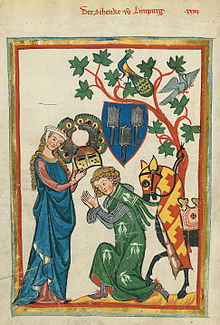 The Truth Behind Knights in Shining Armor by Dana D’Angelo
The Truth Behind Knights in Shining Armor by Dana D’Angelo
What is it about knights that capture our imagination? Is it that they’re true heroes, intent on protecting the less fortunate, fighting bravely and fiercely for their home and country? Is it their admiration for and love of women? This is what Hollywoodwants us to believe.
But if you look closely, there are actually grains of truth in this portrayal.
You see, a seven year old boy, usually from a well off family, would be sent to foster at another home and be trained as a knight. At first he would act as a page, essentially becoming a servant, and heeding his master’s every beck and call. He would start at this humble beginning until he reached the age of about 14 years. At this point, he would graduate to become a squire. He would gain enough confidence from his master to accompany him into battle, although he didn't exactly participate in the fighting.
In his long years of training to become a knight, the squire would learn all sorts of things including battle readiness and the finer arts of socialization. Geoffrey Chaucer, a well known writer in the middle ages, illustrated in one of his characters a squire that had the ability to compose songs, dance, draw, and write. On top of everything, this character had horse riding expertise and proficiency in jousting.
Although Chaucer’s character is obviously fictional, we can assume that these abilities were quite common at the time. Scholars believe that during the early medieval period, warriors acted upon an unspoken rule where they behaved in a courteous and civil manner when dealing with their enemies. As time went on, this behavior gained favor with many people and a knightly code of conduct was formed.
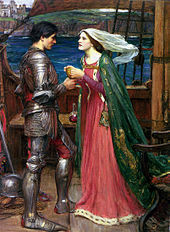 Poems of courtly love were recited throughout the land by troubadours, and the ideals of chivalry were spread. It was around the 13thcentury that romance stories such as the legendary tales of King Arthur and his Knights of the Round Table became extremely popular. It’s debatable whether King Arthur really existed, however these stories further influenced the way a knight behaved toward their enemies and those of a more gentle birth.
Poems of courtly love were recited throughout the land by troubadours, and the ideals of chivalry were spread. It was around the 13thcentury that romance stories such as the legendary tales of King Arthur and his Knights of the Round Table became extremely popular. It’s debatable whether King Arthur really existed, however these stories further influenced the way a knight behaved toward their enemies and those of a more gentle birth.
What resulted from this commitment to chivalry was a strict code of courtly love. A knight, for example, would single out a woman — usually one that was already married. He would admire her from a distance, and write long love poems, professing his undying love and loyalty toward her. And to prove his devotion, he would do dangerous and courageous feats in order to impress her.
A squire would observe all this from his betters, and would try to incorporate the knightly ideals into his own life. When he reached his 20th year or so, he finally had the opportunity to earn his knightly spurs. He would then participate in a religious ceremony, attending a church vigil and taking a purifying bath. And only after these were performed would he then be officially dubbed and declared as “Sir.”
Although we can imagine that it would be near impossible to uphold the chivalric code during the heat of a brutal war, there is still enough evidence to support that many knights followed the ideals of chivalry.
Men — fierce fighters, bold, brave in facing death, yet often displaying a gentle nature… Perhaps, the real reason why we admire these knights in shining armor is because they share many of the same qualities as the heroes of our own time.
*~*~*~*~*
Dana D’Angelo is the author of One True Knight, the first book in The Knights of Honor Trilogy. To learn more about Dana or new release, visit her at www.dana-dangelo.com
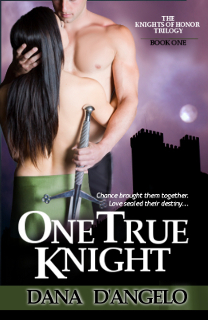 When the beautiful yet feisty Rowena de Belleville discovers her father’s plan to remarry, she fears the worst and flees her home — only to be thrust into the arms of a stranger.
When the beautiful yet feisty Rowena de Belleville discovers her father’s plan to remarry, she fears the worst and flees her home — only to be thrust into the arms of a stranger.
Desperate to hide her identity from her pursuers, she embraces the dark stranger. But her reckless act backfires as it awakens a passion buried deep within her soul, while igniting the fuse of her mysterious benefactor.
Unable to escape destiny, their paths cross yet again. This time she learns the handsome man is Jonathan d’Abelard — the Iron Hawk, a legendary knight feared by all save one faceless killer bent on making his life a living hell…
Will her chance encounter draw them together, or ensnare her in a dangerous game of seduction, feverish desire and vengeance?
Read it now!

 The Truth Behind Knights in Shining Armor by Dana D’Angelo
The Truth Behind Knights in Shining Armor by Dana D’AngeloWhat is it about knights that capture our imagination? Is it that they’re true heroes, intent on protecting the less fortunate, fighting bravely and fiercely for their home and country? Is it their admiration for and love of women? This is what Hollywoodwants us to believe.
But if you look closely, there are actually grains of truth in this portrayal.
You see, a seven year old boy, usually from a well off family, would be sent to foster at another home and be trained as a knight. At first he would act as a page, essentially becoming a servant, and heeding his master’s every beck and call. He would start at this humble beginning until he reached the age of about 14 years. At this point, he would graduate to become a squire. He would gain enough confidence from his master to accompany him into battle, although he didn't exactly participate in the fighting.
In his long years of training to become a knight, the squire would learn all sorts of things including battle readiness and the finer arts of socialization. Geoffrey Chaucer, a well known writer in the middle ages, illustrated in one of his characters a squire that had the ability to compose songs, dance, draw, and write. On top of everything, this character had horse riding expertise and proficiency in jousting.
Although Chaucer’s character is obviously fictional, we can assume that these abilities were quite common at the time. Scholars believe that during the early medieval period, warriors acted upon an unspoken rule where they behaved in a courteous and civil manner when dealing with their enemies. As time went on, this behavior gained favor with many people and a knightly code of conduct was formed.
 Poems of courtly love were recited throughout the land by troubadours, and the ideals of chivalry were spread. It was around the 13thcentury that romance stories such as the legendary tales of King Arthur and his Knights of the Round Table became extremely popular. It’s debatable whether King Arthur really existed, however these stories further influenced the way a knight behaved toward their enemies and those of a more gentle birth.
Poems of courtly love were recited throughout the land by troubadours, and the ideals of chivalry were spread. It was around the 13thcentury that romance stories such as the legendary tales of King Arthur and his Knights of the Round Table became extremely popular. It’s debatable whether King Arthur really existed, however these stories further influenced the way a knight behaved toward their enemies and those of a more gentle birth.What resulted from this commitment to chivalry was a strict code of courtly love. A knight, for example, would single out a woman — usually one that was already married. He would admire her from a distance, and write long love poems, professing his undying love and loyalty toward her. And to prove his devotion, he would do dangerous and courageous feats in order to impress her.
A squire would observe all this from his betters, and would try to incorporate the knightly ideals into his own life. When he reached his 20th year or so, he finally had the opportunity to earn his knightly spurs. He would then participate in a religious ceremony, attending a church vigil and taking a purifying bath. And only after these were performed would he then be officially dubbed and declared as “Sir.”
Although we can imagine that it would be near impossible to uphold the chivalric code during the heat of a brutal war, there is still enough evidence to support that many knights followed the ideals of chivalry.
Men — fierce fighters, bold, brave in facing death, yet often displaying a gentle nature… Perhaps, the real reason why we admire these knights in shining armor is because they share many of the same qualities as the heroes of our own time.
*~*~*~*~*
Dana D’Angelo is the author of One True Knight, the first book in The Knights of Honor Trilogy. To learn more about Dana or new release, visit her at www.dana-dangelo.com
 When the beautiful yet feisty Rowena de Belleville discovers her father’s plan to remarry, she fears the worst and flees her home — only to be thrust into the arms of a stranger.
When the beautiful yet feisty Rowena de Belleville discovers her father’s plan to remarry, she fears the worst and flees her home — only to be thrust into the arms of a stranger. Desperate to hide her identity from her pursuers, she embraces the dark stranger. But her reckless act backfires as it awakens a passion buried deep within her soul, while igniting the fuse of her mysterious benefactor.
Unable to escape destiny, their paths cross yet again. This time she learns the handsome man is Jonathan d’Abelard — the Iron Hawk, a legendary knight feared by all save one faceless killer bent on making his life a living hell…
Will her chance encounter draw them together, or ensnare her in a dangerous game of seduction, feverish desire and vengeance?
Read it now!
Published on October 01, 2012 05:10
September 26, 2012
Video of the Week: Horrible Histories -- William Wallace Song
In celebration of the first two books having released in my new acclaimed Stolen Bride series -- which William Wallace plays cameos in each book in the series -- it is only natural that this week's video is the William Wallace song from Horrible Histories! Awesomesauce :)
Enjoy!
The Stolen Bride Series...Book One: The Highlander's Reward -- Amazon / Barnes and Noble
Book Two: The Highlander's Conquest -- Amazon/ Barnes and Noble
Book Three: The Highlander's Lady -- coming soon!
Enjoy!
The Stolen Bride Series...Book One: The Highlander's Reward -- Amazon / Barnes and Noble
Book Two: The Highlander's Conquest -- Amazon/ Barnes and Noble
Book Three: The Highlander's Lady -- coming soon!
Published on September 26, 2012 06:25
September 25, 2012
New Release! The Highlander's Conquest -- Book 2: The Stolen Bride Series
 I'm thrilled to announce that a few days ago, The Highlander’s Conquest, Book Two: The Stolen Bride Series, has released in both print and ebook!
I'm thrilled to announce that a few days ago, The Highlander’s Conquest, Book Two: The Stolen Bride Series, has released in both print and ebook!What is a Highlander to do when he falls for the daughter of his enemy?
Highland warrior, Blane Sutherland, has one mission: disguise himself as an Englishman, cross the border and retrieve Lady Aliah de Mowbray. Always up for a challenge, he agrees, pursuing his conquest with vigor—and trying to deny the powerful desire that eclipses him each time he touches his charge. A rogue of the highest order and a younger son, he has nothing to offer a lady but a broken heart.
And what is a lady to do when she cannot trust her heart?
Aliah is skeptical of the English noble who has come to take her to her father and sister in Scotland, but she pushes her doubts aside. Without word in months, she must make certain her family is safe, then she can return to England to join the convent to which she has sworn to pledge her life. But then her escort reveals his true self—he’s a Highlander and his kisses are more seductive than the sweetest of wines.
Surrender never tasted so sweet…
“An author with a natural gift for story telling…” ―Victoria Roberts, acclaimed author of Temptation in a Kilt
"Sweet, funny, sensual and deliciously intriguing! You don't want to miss another of Ms. Knights HOT adventures through the Highlands!" -- Andrea Snider, Reader Review
Here's an excerpt from Chapter One:
Late FallNorthern England, 1297
A violent banging at the manor door startled Aliah from her studies and set Frosty, the family’s monstrous Irish wolfhound, to barking ferociously. Aliah jerked backward against the oak chair she sat in, hitting her head against the ancient wood and stifling a harsh word beneath her breath.Her father, Baron de Mowbray, had left a small contingent of men to protect her while he escorted her older sister Arbella to her bridegroom in Scotland. These men would fight to keep her safe until their very last breaths.But who was to say they hadn’t already taken that last shuddering inhale?Aliah glanced around the room, filled with memories, but not with people. Today, her maid Glenda was her only companion. Well, Frosty as well—who in fact was a far superior protector than her maid. Swallowing her fear, she rubbed the ache from the back of her head and squared her shoulders. Strength. That was what she needed, even if the sound of someone knocking made her want to run to the opposite end of the manor and hide.Her father should have returned a month ago. The only news she’d managed to garner was that a battle took place at Stirling Bridge in Scotland—the very place her sister was to marry.Had the battle now come to her own door?Aliah jumped as a strong fist once again slammed the door.“Glenda, would you answer the door?” Aliah asked.’Twas Saturday morning and most of the servants had gone to tend family or to enjoy themselves in whatever way they did, leaving Aliah quite alone—and at the mercy of whoever stood outside her door. Could they have dispensed of her father’s guards so quickly?Glenda, afraid of her own shadow, started to shake her head, but Aliah gave her a stern look. The woman had been driving her mad since she was a babe and ever since Arbella left, Aliah had little patience for the older woman’s nonsense.Aliah set down the book of Gaelic she’d been studying—she was determined to learn the language because she secretly believed the Scots would soon invade. Understanding their barbaric conversations was crucial. Aliah smoothed her gown and stood tall.Glenda scurried toward the door, Frosty a foot ahead of her.Aliah tried to find comfort in the fact that perhaps the guards had allowed whoever came knocking through the manor gates. She’d heard no clanging of metal or yells of pain. Aye, the only conclusion that made sense was, they were not enemies, but friends.She could use a good friend. The comfort of someone she knew. Aliah frowned. She had few friends, and seldom was it that they dropped by.So who had the audacity to practically beat down her door?“Wait!” Aliah shouted just as Glenda touched the wooden plank barring the door.She hurried to retrieve her bow and an arrow from beneath her chair. As swiftly as possible, she cocked an arrow and aimed it at the door. Taking a deep breath, she nodded for her maid to open it. If her father’s enemies dared to come after her, they were in for a big surprise, she wouldn’t surrender so easily.An interminable amount of time seemed to pass before the door was fully open. Aliah stepped back, speechless. Standing before her was the most staggeringly handsome man she’d ever seen—and he was quite alone. Frosty growled for only a moment, quickly silenced by a motion the stranger made with his hand. What? How had he done that? Aliah struggled to keep her mouth from falling open at the man’s effortless command of the dog. The animal had favored her sister, but since Arbella had left, Frosty refused to leave Aliah’s side.She felt a certain amount of betrayal at Frosty’s easy acceptance of this stranger. Who in the name of God was he? And why didn’t one of her father’s men escort him? She’d have to speak with them about that later.The visitor wore an intriguing cap of deep burgundy, a dark feather jutting from the side, held on by some sort of medallion. A thick black wool cloak lay open to reveal a matching tunic, and leather studded armor. White hose outlined the shape of his legs in a way that drew her eyes from his intense dark green gaze. His boots were made of soft, expensive-looking leather, and the gilded belt at his waist held a gleaming, sharp sword that was hard to miss.Aliah allowed her gaze to travel over the length and breadth of his solid form, before getting ahold of herself.“Will you shoot me, my lady?” His voice was deep, raspy, and stroked along the ends of her nerves in a way that made her want to run away and kiss him at the same time.Where had that thought come from? She’d never kissed a man. And she never would. She’d pledged her life and future to God. Shame crawled through her making her cheeks heat with embarrassment. Even her toes felt the blush of such a carnal thought.Aliah had to gain some control of her wayward mind. Her life belonged to the church—penance for having caused her mother’s death. There was no room for kissing or men in her life. Not even for a thought.“Apologies, sir, but one can never be too careful. I am Lady Aliah.” She kept her arrow pointed at his heart, taking note of how his tunic and leather studded armor strained over what appeared to be a very broad, taut chest.“Sir Blane of Yorkshire.” He doffed his cap and bowed low, then returned upright, settling his cap back in place.She tilted her head, studying the angles and lines of his face, taking in the pleasant smile of his wide, full lips. He didn’t appear to be someone she should be wary of, but as she’d learned over the years, looks could oft be deceiving. Aliah flicked her gaze toward her maid who wrung her hands and looked ready to bolt from the room.Deciding that for the moment he did not have any designs to harm her, Aliah disarmed her arrow and lowered the bow. “Welcome to Mowbray Manor, Sir Blane. Have you any men with you?”“Aye, I’ve left them by the stables. I assure you, we come on friendly terms.”Aliah nodded, making her lips thin so as to keep them from trembling. Did he come with news of her father, of Arbella? She shivered. The news must not be good. If her father were able, he would announce his return himself. Her spirits lowered, replaced by a dull, cold pulse.He smiled, disarming her, his lips curving in a rascally way that set her to shivering and then to quickly reciting a Hail Mary in her mind for penance.“I come with a message, my lady. If I may?” He swept out his hand, asking permission to fully enter their great hall.She nodded again, not sure she could trust her voice.Glenda backed away, but Aliah quickly caught her gaze. “Fetch our guest some refreshment.” She motioned for Sir Blane to sit at the long trestle table. “There is no need to wait, please tell me what news you bring.”Sir Blane pulled out her chair before taking his own seat, and she disliked how that chivalrous move made her feel warm and tingly inside.“I come from Scotland, my lady.”She felt the blood rush from her face, but quickly recovered. There could only be one thing he needed to relay and she was positive she was not ready to hear it. Just then, Glenda returned setting down a pitcher of watered wine and two glasses. She left again, coming back several moments later with a trencher of hard cheese, a few apples and day old brown bread. After setting down the food, Glenda made a hasty retreat from the room.Aliah poured his wine and pushed the goblet towards him, then snatched an apple from the trencher. Slicing a piece, she bit into it, hoping the man would eat and forget that she’d asked to hear the news.But alas, that was not to be. After a hearty bite of cheese and bread, Sir Blane’s green eyes met hers. “My lady, I come with a message from your father. He and your sister are well and wish you to accompany them in Scotland for a spell.”“They are well?” Her voice sounded weak to her own ears and her heart pounded against her ribs.“Aye, heartily so.”Aliah released a shuddering breath. “And Arbella, is she married then?”A strange expression briefly crossed his face before disappearing. “Aye.”What did that expression mean? “Is she happy?”“I believe so.”But would the man say otherwise? ’Twas really none of his business whether or not her sister was happy, and if he were truly just the messenger then he wouldn’t know anyway.“How can I know you speak the truth?”As if the sting of Frosty’s earlier betrayal was not enough, the great wolfhound sidled up to Sir Blane and nuzzled him in the ribs. Absently, the man rubbed Frosty behind his ears.“My lady, I come with direct orders from your sister. Arbella told me herself to tell you that it pained her not to have you at the wedding with her, and that she hoped you’d help her to settle into her new home.”Aliah frowned. Was he telling her the truth? It made no sense. Hadn’t Arbella told her not to come before she left? So what changed her mind? Why would Arbella say such a thing? Aliah had agreed for her own personal reasons. Reasons no one knew about. If Blane were telling the truth, this would surely hinder her plans. There were only a few short months before spring and Aliah was due to present herself to Mother Superior, never to leave the convent again. Although her sister wasn’t aware of that, going to Scotland to be with her sure did put a glitch in her arrangements if it meant Aliah couldn’t return in time.“Your father sent this.” Sir Blane reached into his pocket and pulled out a rolled scroll.The seal was plain wax. “My father’s seal is not on this missive.” Aliah handed it back, intent now on figuring out a way to escape. Who was this man and why was he trying to lure her away from her home? A sense of unease made her suspicious.Sir Blane didn’t even bat an eye. “Ah, yes. Your father knows you well. As I told you, there was a battle. He lost his seal during the encounter and bid you forgive him for such.”“Was he injured?”The knight shook his head. “Not overly so. A few scrapes and bruises.”“And Arbella—”She sucked in a breath and held it, regaining her composure. “Was she near the skirmish?”Again that odd look crossed Sir Blane’s face. “No, she was perfectly protected.”Aliah broke the seal and read the short, two-lined note stating her presence was requested in Scotland. It was signed by her father. His script appeared shaky, but that was not alarming as he’d just been in a battle. After rolling up the parchment, she set it aside and returned her attention to her guest.Should she trust him? Could she trust him? Her father may have been forced to sign the missive. But why? What could Sir Blane possibly want with her? If the knight had her father and her sister, taking her wouldn’t further his cause. Aliah’s instincts were failing her. Saints preserve me!He tore off a hunk of bread, bit into it and chewed as his eyes roved over the room. She took the opportunity to study his features. His skin was darkened from the sun, and a brush of stubble covered his cheeks and chin. Aliah fought the urge to reach out and brush her fingers over it to see how rough it was. She would be doing penance for a month if Mother Superior knew the thoughts going through her mind. Pledging herself to God meant she should not care about the texture of his face. It meant that the way he smiled should not make her melt.Aliah watched in utter fascination as his throat bobbed after taking a swallow of wine. “’Tis a homey place you have here,” he murmured.Aliah glanced away from him and stared at the walls covered in tapestries her mother, grandmother and several other generations of Mowbray women had woven. Some depicted battle scenes, victories, while others showed glorious moments in their family’s history, like a man being knighted, or the birth of an heir. A few even depicted warm moments that she missed the most—especially the one that embodied her mother, with Aliah, Arbella and their brother Samuel as small children, playing at her feet—a moment that had never come to pass. The latter was sewn by her aunt some years after Aliah’s mother’s death as a comfort to the family. But to Aliah it was a constant reminder of what she didn’t have. She still felt an empty void where the love of a mother should be.“Aye, I suppose it is.” She glanced back at him. “Is your home not so?”He shook his head, his eyes saddening. She wanted to ask why, what made his mood change, but didn’t. That would have been awkward coming from someone he barely knew. And she didn’t want to offer him the chance to get more personal, even if it were only on a basic level.His face cleared and Sir Blane pushed back from the table. “I hate to rush you, my lady, but we must be going now. ’Tis a long journey to our destination and the weather will soon be turning surly.”Glenda gasped. Aliah had not realized her maid had returned, and she threw a disgusted look in Glenda’s direction. She knew what Glenda was thinking—that if Aliah were to leave she would surely die of the cold—and Aliah was also aware that it was utter rubbish. Glenda had been filling the girls’ ears with rumors and terrors of the Scots since they were babes, and while Arbella had taken them to heart, Aliah knew better—but only by accident. She hadn’t meant to eavesdrop, but one evening after Glenda had consumed too much wine, Aliah heard her confess to another maid that her own mother had told her those things. And everyone knew that Glenda’s mother was mad.Aliah had only ever met a Scot once —a woman in fact, who’d been married to a neighboring lord, and she’d been the epitome of grace and calm. If it weren’t for her Scottish burr, Aliah would have thought she was an English noblewoman. She’d begged to go with her father when he made the trek to congratulate them on their wedding and he’d acquiesced since Arbella and Samuel were both busy with their studies.Ever since meeting the Scottish Woman, Aliah never paid much attention to Glenda’s rantings. And so, she didn’t mind the journey to Scotland for the cold, she minded it for another reason entirely.“I shall need an escort.”“Aye, indeed, my lady, I shall provide you escort.”She shook her head. “No, that won’t do.”He gazed at her quizzically. “Why not?”“I’ll need a female companion.”He pointed to her maid. “This one shall do.”Aliah rolled eyes at the choking noise that Glenda made. “Glenda does not travel.”A hint of knowledge glowed in his green eyes. “That is Glenda?” He nodded. “Makes sense now.”“You’ve heard of her?”“Oh, aye. Your sister speaks of her often.” His smile was catching and she found herself returning it.“What did she say?” “What manner of horrid things we—I mean the Scots—would do to her.”What did he mean by we? He picked up his glass of wine and chugged it. Perhaps the slip of his tongue was the wine, or lack of sleep. If he knew of Glenda from her sister—and she could only imagine what Arbella had said—she could trust him, couldn’t she?“Where is it exactly that we shall travel to?” she asked.“The Highlands, my lady.”A chill caught her and she tried to downplay the gooseflesh rising on her arms. “And what is my family doing there? I thought their destination was Stirling?”“’Tis where they are seeking shelter. Stirling is in a bit of unrest.” He waved his hand, dismissing the topic. “We must depart, my lady. Pack a satchel or two. That is all. We can send for more things if they are needed. But we must ride quickly and too much baggage will hold us back.”Aliah sensed urgency in his tone, which made her wary. But all the same, this man knew her father and sister and said he would take her to them. She needed to see that they were safe, before she was cut off from the world by entering into the church where she would take a vow of silence for a year. She hesitated for a moment. He had to be telling the truth, didn’t he? She had her doubts but she didn’t have any other choice but to trust him. Her father and Arbella might need her help. How could she give herself over to the church if she gave into her fears and didn’t help her father and Arbella in their time of need? Reluctantly she stepped forward, tilted her chin and met his gaze.“I will be ready within a half-hour. Would you care for a bath or some other comfort while you wait?”He shook his head. “I thank you, my lady, for the generous offer, and while I would relish a bath, there is simply not enough time. I will see to my men and procure a mount for you.”Aliah nodded for Glenda to follow as she made her way upstairs to her chamber. Once inside, her maid broke into a terrified litany, chewing her fingernails to the quick. “My lady, you cannot go with him. You don’t know who he is, and he could be a barbarian himself for all you know. He will cook you up for dinner. He could have done the same to your sister and your father—absorbed their souls—and that is the only way he knew you were here.”Rolling her eyes heavenward, Aliah threw open her wardrobe and pulled out a leather satchel that her father had given her. “Glenda, stop your blubbering. You saw yourself he was English and he had a letter from my father.”“Oh, I… Oh…” Glenda rushed around the room, doing nothing productive whatsoever. The woman opened the wardrobe wider, banging the door into Aliah’s shoulder before shutting it again. She rushed to poke at the non-existent fire, then turned to mess with the coverlet on Aliah’s bed. “You will at least pack your bow?”“And my arrows,” Aliah said sarcastically. She pulled a couple gowns, shifts and hose from the wardrobe and tucked them into the satchel. “Help me change into a more suitable riding gown.”Glenda clucked and tugged at Aliah’s gown until she shoved the maid’s hands away and finished the job herself. The woman was completely useless.“Be cautious, my lady.”“I assure you, Glenda, I will not let any man put my bones in his beard, nor shall I succumb to death from the cold.” She’d almost forgotten to get her cloak. She pulled out the black wool, fur-lined cloak, and then switched from slippers to her sturdy leather boots.“Oh, I do hope that is the case, my lady. Arbella seems to have made it alive. Which leads me to believe you might also.”“Your encouragement overwhelms me.” Aliah bit the inside of her cheek to keep from laughing. “Fare thee well, Glenda.”Tears brimmed in the older woman’s eyes. Despite her fear of the Scots and all the crazy notions she’d filled their heads with, Glenda meant well, and had been the only motherly figure Aliah had ever known. Dropping her satchel, she pulled her maid in for a hug, breathing in the scent of bread and rosemary that always seemed to cling to her. She would miss her.“I shall return soon, Glenda.” She wished to tell her maid of her promise to the church and that she intended to grace the sanctuary’s threshold come the first day of spring, but word would get to her father who was certain not to agree. As much as she wanted to tell Glenda, she couldn’t take the chance.Glenda nodded, wiping a tear with her sleeve. “I shall pray for your safety.”“I thank you.” Before she lost the courage she’d summoned to embark on this sudden journey, Aliah quit the room and the only home she’d ever known.
Read the rest!: Amazon/ Barnes and Noble
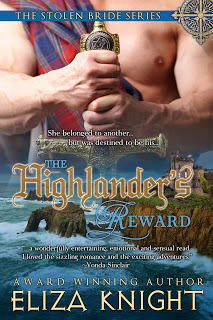 Did you miss The Highlander's Reward, BOOK ONE: The Stolen Bride Series?
Did you miss The Highlander's Reward, BOOK ONE: The Stolen Bride Series?She belonged to another… But was destined to be his…Lady Arbella de Mowbray abhors the idea of marrying an English noble occupying Scotland. When she arrives in Stirling, she is thrown into the midst of a full battle between the Scots and the English. Besieged by rebels, she is whisked from her horse by a Highland warrior who promises her safety. But when he kisses her she fears she's more in danger of losing herself.
The last thing Magnus Sutherland wants is to marry the beautiful English lass he saved. As the laird of his clan, he has a responsibility to his clan and allies. But when Arbella is attacked by one of his own men, he determines the only way to keep her safe is to make her his. A decision that promises to be extremely satisfying.
Magnus brings Arbella to his home of Dunrobin Castle in the Highlands. And that’s where the trouble begins… Their countries are at war and they should be each other’s enemy. Neither one considered their mock marriage would grow into a deeply passionate love. What’s more, they were both unhappily betrothed and those who've been scorned are out for revenge. Can their new found love keep them together or will their enemies tear them apart?
“Eliza Knight has crafted a wonderfully entertaining, emotional and sensual read. I loved the sizzling romance and the exciting adventures. Magnus, the hot Highland hero, stole my heart just as he did Arbella’s.” Vonda Sinclair, Award-Winning author of Scottish romance
Buy Links: Amazon / Barnes and Noble
Visit me at...
WebsiteFacebookTwitter @ElizaKnight
Published on September 25, 2012 06:49
September 24, 2012
A BEGINNERS GUIDE TO THE ENGLISH LAWS OF SUCCESSION by Alison Stuart
Please join me today in welcoming Alison Stuart, a fellow member of Hearts Through History. I read her article on the laws of succession in our monthly newsletter and just had to share it with you all! Thank you, Alison, for visiting with us today!!! Enjoy!
A BEGINNERS GUIDE TO THE ENGLISH LAWS OF SUCCESSIONby Alison Stuart
Thank you, Eliza, for the invitation to post my article on the English Laws of Succession...or Laws of Succession 101.

Firstly my qualifications for writing this article - I was a practicing lawyer for over 30 years in the Australian jurisdiction, which is an English common law system rather than the American codified legal system. If you are struggling with understanding the English common laws of succession then don’t panic ...most lawyers don’t understand them either.
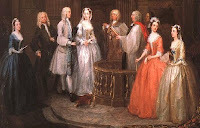 A weddingThe English aristocracy depended for survival on the devolution of their estate from one generation to the next and by the mid thirteenth century the common law had set in place certain rules of inheritance which determined who could inherit based on a “parentelic” calculus (now there's a phrase that just rolls off the tongue!) ie those who could trace their blood directly to the deceased. Rather than split the ever diminishing estate between your children (as is the case in many European countries), it was determined you should only have one heir and that heir should be descended from you by direct line.
A weddingThe English aristocracy depended for survival on the devolution of their estate from one generation to the next and by the mid thirteenth century the common law had set in place certain rules of inheritance which determined who could inherit based on a “parentelic” calculus (now there's a phrase that just rolls off the tongue!) ie those who could trace their blood directly to the deceased. Rather than split the ever diminishing estate between your children (as is the case in many European countries), it was determined you should only have one heir and that heir should be descended from you by direct line.
Male descendents would always be preferred to female (although inheritance by female descendants was possible). The law decreed that your estate went first to children or grandchildren or in the absence of those then to brothers, cousins, nephews etc. If the deceased died leaving daughters but no sons, then the parentelic calculus would allow the daughters to inherit over say a brother or a cousin. If there were multiple males in the line then the law of “primogeniture” applied...ie it went to the first born. These basic rules of inheritance lasted into the twentieth century.
However this left spouses, younger siblings, illegitimate children and daughters without any rights of inheritance. In short they could only be provided for during the life of the father. As nothing in the law prevented a newly inherited heir from selling off his newly acquired estate, to prevent a youthful heir from squandering his inheritance, family settlements, away from the will, became common.
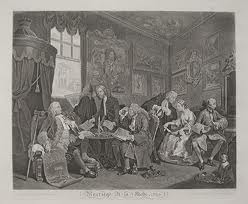 One way of disposing of property was to make a gift (generally on marriage) to the couple and their progeny eg “To H and W and the heirs of their bodies begotten”...or the “male heirs of their bodies begotten”. This gift could not then be disposed of until there were no heirs when the gift would revert to the donor. This was called the “fee tail”...or to use the word more common in our writing “entailment”. Entails in stories we are familiar with are Downton Abbeyand Pride and Prejudice. In the absence of a male heir, for the direct family line to maintain a hold in the land, it was desirable one of the girls marry the heir...always good fodder for a story viz Matthew/Mary and Mr. Collins/Lizzie.
One way of disposing of property was to make a gift (generally on marriage) to the couple and their progeny eg “To H and W and the heirs of their bodies begotten”...or the “male heirs of their bodies begotten”. This gift could not then be disposed of until there were no heirs when the gift would revert to the donor. This was called the “fee tail”...or to use the word more common in our writing “entailment”. Entails in stories we are familiar with are Downton Abbeyand Pride and Prejudice. In the absence of a male heir, for the direct family line to maintain a hold in the land, it was desirable one of the girls marry the heir...always good fodder for a story viz Matthew/Mary and Mr. Collins/Lizzie.
I won’t go into the complications and machinations that lawyers devised to “bar the tail” - remove the tail from estates to allow the land to pass freely according to the general laws of inheritance. Succession law kept lawyers and courts busy (and still does) for years and years. Dickens wrote about this subject in Bleak House (the case of Jarndyce v Jarndyce). It is probably surprising to note that the basic laws of inheritance and entailment did not change until the Property Law Act of 1925.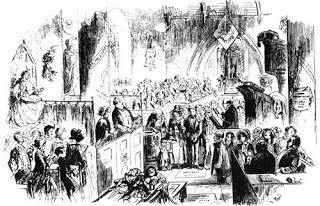 Bleak House
Bleak House
Example: Lord Fauntleroy is the proud possessor of Fauntleroy Park. · The estate is not entailed and he has three sons. The eldest son inherits Fauntleroy Park. #2 goes into the church and #3 into the army...If he has no sons but a daughter then the daughter inherits. · The estate is entailed and the terms of the original settlement stipulate “male heirs”. If he has a son then it goes to the son by operation independent of the will. If he has a daughter, she is excluded by the entail and the estate goes to second cousin Rufus Stuffnpuff. In the absence of any assets independent of the entail, her prospects are grim!
Dowers and jointures
A wife was completely outside the laws of inheritance - your estate passed to your children or through the entail. Husband and wife were counted, at law, as one person so a husband could not make a gift to his wife during his lifetime with one notable exception. A gift from husband to wife on the day they married, at the church door, could take effect on the husband’s death if he predeceased her. This was “dower” and was subject to the supervision of the church. The dower lands were nominated before the marriage service, and after the husband had given his wife the ring saying “With this ring I thee wed”, he gave her tokens symbolising dower with the words “With this dower I thee endow”.
The effect of the dower was to give the wife an interest for her life in the nominated lands. If the husband died without a will, the widow was deemed to inherit one third of her husband’s estate, independent of any specific dower. However if the bulk of the estate passed outside the will through the entail, there may not have been much for the widow or other children.
There was also a practice of settling land on husband and wife jointly so as to entitle the wife to an estate called a “jointure” instead of a dower. A wife could elect to take their common law dower or her jointure but not both.
What if a man married an heiress? If his wealthy wife predeceased him, the widower was allowed, by law to continue to enjoy her estate for his life, providing there was a child of the marriage capable of inheriting. So in effect the husband held the land on trust for his child. This was called “tenancy by curtesy”.
The laws of succession are complex and I am happy to answer specific questions if you would like to email me at alison@alisonstuart.com
 Alison Stuart is an award winning Australian writer of historicals with heart. Whether duelling with dashing cavaliers or waywards ghosts, her books provide a reader with a meaty plot and characters who have to strive against adversity, always with the promise of happiness together. Alison is a lapsed lawyer who has worked in the military and fire service, which may explain a predisposition to soldier heroes. She lives with her own personal hero and two needy cats and likes nothing more than a stiff gin and tonic and a walk along the sea front of her home town. She loves to hear from her readers and can be found at her website, facebook, twitter and Goodreads. Her latest book, GATHER THE BONES, is a “Downton Abbeyesque” haunting love story set in 1923.
Alison Stuart is an award winning Australian writer of historicals with heart. Whether duelling with dashing cavaliers or waywards ghosts, her books provide a reader with a meaty plot and characters who have to strive against adversity, always with the promise of happiness together. Alison is a lapsed lawyer who has worked in the military and fire service, which may explain a predisposition to soldier heroes. She lives with her own personal hero and two needy cats and likes nothing more than a stiff gin and tonic and a walk along the sea front of her home town. She loves to hear from her readers and can be found at her website, facebook, twitter and Goodreads. Her latest book, GATHER THE BONES, is a “Downton Abbeyesque” haunting love story set in 1923.

A BEGINNERS GUIDE TO THE ENGLISH LAWS OF SUCCESSIONby Alison Stuart
Thank you, Eliza, for the invitation to post my article on the English Laws of Succession...or Laws of Succession 101.

Firstly my qualifications for writing this article - I was a practicing lawyer for over 30 years in the Australian jurisdiction, which is an English common law system rather than the American codified legal system. If you are struggling with understanding the English common laws of succession then don’t panic ...most lawyers don’t understand them either.
 A weddingThe English aristocracy depended for survival on the devolution of their estate from one generation to the next and by the mid thirteenth century the common law had set in place certain rules of inheritance which determined who could inherit based on a “parentelic” calculus (now there's a phrase that just rolls off the tongue!) ie those who could trace their blood directly to the deceased. Rather than split the ever diminishing estate between your children (as is the case in many European countries), it was determined you should only have one heir and that heir should be descended from you by direct line.
A weddingThe English aristocracy depended for survival on the devolution of their estate from one generation to the next and by the mid thirteenth century the common law had set in place certain rules of inheritance which determined who could inherit based on a “parentelic” calculus (now there's a phrase that just rolls off the tongue!) ie those who could trace their blood directly to the deceased. Rather than split the ever diminishing estate between your children (as is the case in many European countries), it was determined you should only have one heir and that heir should be descended from you by direct line. Male descendents would always be preferred to female (although inheritance by female descendants was possible). The law decreed that your estate went first to children or grandchildren or in the absence of those then to brothers, cousins, nephews etc. If the deceased died leaving daughters but no sons, then the parentelic calculus would allow the daughters to inherit over say a brother or a cousin. If there were multiple males in the line then the law of “primogeniture” applied...ie it went to the first born. These basic rules of inheritance lasted into the twentieth century.
However this left spouses, younger siblings, illegitimate children and daughters without any rights of inheritance. In short they could only be provided for during the life of the father. As nothing in the law prevented a newly inherited heir from selling off his newly acquired estate, to prevent a youthful heir from squandering his inheritance, family settlements, away from the will, became common.
 One way of disposing of property was to make a gift (generally on marriage) to the couple and their progeny eg “To H and W and the heirs of their bodies begotten”...or the “male heirs of their bodies begotten”. This gift could not then be disposed of until there were no heirs when the gift would revert to the donor. This was called the “fee tail”...or to use the word more common in our writing “entailment”. Entails in stories we are familiar with are Downton Abbeyand Pride and Prejudice. In the absence of a male heir, for the direct family line to maintain a hold in the land, it was desirable one of the girls marry the heir...always good fodder for a story viz Matthew/Mary and Mr. Collins/Lizzie.
One way of disposing of property was to make a gift (generally on marriage) to the couple and their progeny eg “To H and W and the heirs of their bodies begotten”...or the “male heirs of their bodies begotten”. This gift could not then be disposed of until there were no heirs when the gift would revert to the donor. This was called the “fee tail”...or to use the word more common in our writing “entailment”. Entails in stories we are familiar with are Downton Abbeyand Pride and Prejudice. In the absence of a male heir, for the direct family line to maintain a hold in the land, it was desirable one of the girls marry the heir...always good fodder for a story viz Matthew/Mary and Mr. Collins/Lizzie.I won’t go into the complications and machinations that lawyers devised to “bar the tail” - remove the tail from estates to allow the land to pass freely according to the general laws of inheritance. Succession law kept lawyers and courts busy (and still does) for years and years. Dickens wrote about this subject in Bleak House (the case of Jarndyce v Jarndyce). It is probably surprising to note that the basic laws of inheritance and entailment did not change until the Property Law Act of 1925.
 Bleak House
Bleak HouseExample: Lord Fauntleroy is the proud possessor of Fauntleroy Park. · The estate is not entailed and he has three sons. The eldest son inherits Fauntleroy Park. #2 goes into the church and #3 into the army...If he has no sons but a daughter then the daughter inherits. · The estate is entailed and the terms of the original settlement stipulate “male heirs”. If he has a son then it goes to the son by operation independent of the will. If he has a daughter, she is excluded by the entail and the estate goes to second cousin Rufus Stuffnpuff. In the absence of any assets independent of the entail, her prospects are grim!
Dowers and jointures
A wife was completely outside the laws of inheritance - your estate passed to your children or through the entail. Husband and wife were counted, at law, as one person so a husband could not make a gift to his wife during his lifetime with one notable exception. A gift from husband to wife on the day they married, at the church door, could take effect on the husband’s death if he predeceased her. This was “dower” and was subject to the supervision of the church. The dower lands were nominated before the marriage service, and after the husband had given his wife the ring saying “With this ring I thee wed”, he gave her tokens symbolising dower with the words “With this dower I thee endow”.
The effect of the dower was to give the wife an interest for her life in the nominated lands. If the husband died without a will, the widow was deemed to inherit one third of her husband’s estate, independent of any specific dower. However if the bulk of the estate passed outside the will through the entail, there may not have been much for the widow or other children.
There was also a practice of settling land on husband and wife jointly so as to entitle the wife to an estate called a “jointure” instead of a dower. A wife could elect to take their common law dower or her jointure but not both.
What if a man married an heiress? If his wealthy wife predeceased him, the widower was allowed, by law to continue to enjoy her estate for his life, providing there was a child of the marriage capable of inheriting. So in effect the husband held the land on trust for his child. This was called “tenancy by curtesy”.
The laws of succession are complex and I am happy to answer specific questions if you would like to email me at alison@alisonstuart.com
 Alison Stuart is an award winning Australian writer of historicals with heart. Whether duelling with dashing cavaliers or waywards ghosts, her books provide a reader with a meaty plot and characters who have to strive against adversity, always with the promise of happiness together. Alison is a lapsed lawyer who has worked in the military and fire service, which may explain a predisposition to soldier heroes. She lives with her own personal hero and two needy cats and likes nothing more than a stiff gin and tonic and a walk along the sea front of her home town. She loves to hear from her readers and can be found at her website, facebook, twitter and Goodreads. Her latest book, GATHER THE BONES, is a “Downton Abbeyesque” haunting love story set in 1923.
Alison Stuart is an award winning Australian writer of historicals with heart. Whether duelling with dashing cavaliers or waywards ghosts, her books provide a reader with a meaty plot and characters who have to strive against adversity, always with the promise of happiness together. Alison is a lapsed lawyer who has worked in the military and fire service, which may explain a predisposition to soldier heroes. She lives with her own personal hero and two needy cats and likes nothing more than a stiff gin and tonic and a walk along the sea front of her home town. She loves to hear from her readers and can be found at her website, facebook, twitter and Goodreads. Her latest book, GATHER THE BONES, is a “Downton Abbeyesque” haunting love story set in 1923.
Published on September 24, 2012 05:05
September 22, 2012
Historical Fiction Review: Rebel Heart by Caroline Wilson
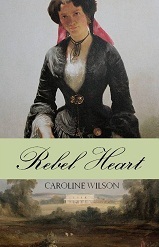 This historical fiction review was completed by Callie Hutton, one of History Undressed's wonderful new reviewers!
This historical fiction review was completed by Callie Hutton, one of History Undressed's wonderful new reviewers!
About the Book
Julienne Dalton’s privileged existence is shattered when her family’s plantation home is burned and her father murdered by Union soldiers. Desperate for justice, she is drawn into a Confederate spy ring after overhearing important battle plans. But when Julienne meets Alexander Caulfield, a charming British expatriate, she begins to question her desire for vengeance.
They marry after a hasty courtship and only then does Julienne discover that Alex is in the employ of the enemy. Heartbroken and fearing for her life, she escapes the country, bound for Europe. But she must be on her guard at all times for now she is the one with a dangerous secret. Alex could find her at any moment and if he does—will it be to rekindle the brief passion they shared or to exact revenge for her treachery?
Available now for Amazon Kindle
My Review
During the Civil War, Julienne Dalton is left an orphan when her father is killed and she is burned out of her home by Union Soldiers. In an attempt to assuage her father’s death, she becomes a spy for the Confederacy. But she never counted on meeting Englishman, Alexander Caulfield, on a mission of his own. Their quick courtship results in marriage, but both carry secrets that can destroy the other.
I must admit it took me a while to get into Rebel Heart. For some reason the author has chosen to write this tale in both first person and third person, switching back and forth as the story progresses. I found it jarring, and never really got used to it.
However, this is a wonderful story with strong characters, and a riveting storyline. Julienne is everything a heroine should be, and Alexander compliments her perfectly. Rebel Heart is the type of story that tears at your heart, bringing all the human emotions to the reader. I laughed, cried, and felt deep sympathy for the suffering of Julienne and Alexander.
I strongly recommend this book, and look forward to more of this talented author’s work. Well done, Ms. Wilson.
Published on September 22, 2012 12:00
Historical Romance Review: This Heart for Hire by Elysa Hendricks
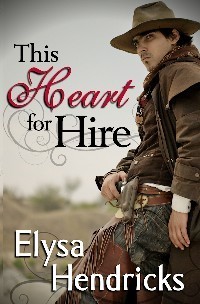 This historical romance review of THIS HEART FOR HIRE by Elyssa Hendricks was done by one of History Undressed's fabulous new reviewers: Emma Westport.
This historical romance review of THIS HEART FOR HIRE by Elyssa Hendricks was done by one of History Undressed's fabulous new reviewers: Emma Westport.About the Book
A convent reared innocent and a gunslinger with no memory struggle to survive and find love while crossing the dangerous west Texas frontier.
Abandoned by his father and betrayed by his half-brother and fiancee on the eve of his wedding, JAKE GALLAGHER no longer believes in love. Though he longs to go home, his undercover work for the Texas Rangers keeps him in a lawless Texas border town. Even though it jeopardizes his mission he refuses to stand by and watch outlaws rape and murder a young woman. Getting shot and losing his memory wasn’t part of his plan.
While fleeing from her stepfather’s plans to steal their ranch, CHRISTINA GOODWIN witnesses her brother’s murder and is left in the hands of a merciless band of outlaws. Raised in a strict convent, Christina has little knowledge of men or the world, its dangers and temptations. Frightened and alone, she is forced to accept the help of the dark gunslinger who rescues her. Though drawn to Jake’s potent masculinity, she hesitates to trust him, fearing her stepfather has sent him to bring her back. Unsure of Jake’s motives for helping her, she struggles against him, determined to find a way to avenge her brother’s death and regain control of her ranch from her stepfather.
Available now in ebook!
My Review
Jake Gallagher is a part time lawman with his own problems, not the least of which is protecting a pretty, would be nun from the bandits who murdered her brother. Christina Goodwin, raised in a convent, is now on the run, trying to escape a stepfather she hates, the stepfather who wants to marry her to gain control of the ranch she owns.
What follows is a chase across 1870’s Texas and New Mexico that forces both Jake and Christina to confront their pasts. The journey is difficult and painful, obstacles and adventures abound, and the harshness of their struggle is set against the vividly written beauty of the American West. At times, some plot twists are too convenient and, at others, serious issues are raised but glossed over. However, the story is fast paced, the writing skillful and all the subplots are resolved. In This Heart for Hire, the characters make the story. Their ‘happily ever after’ is hard earned. And that, more than anything, makes the story very satisfying.
Published on September 22, 2012 09:00



